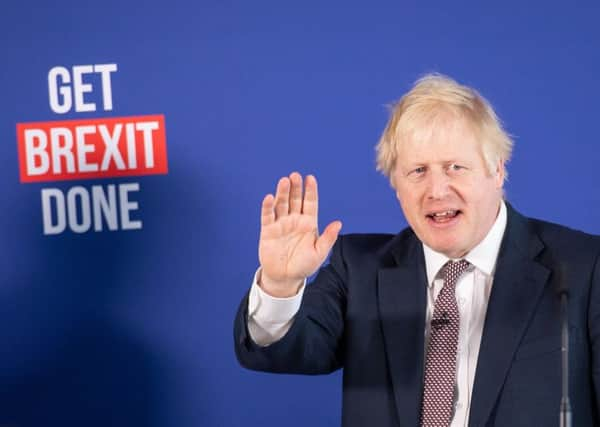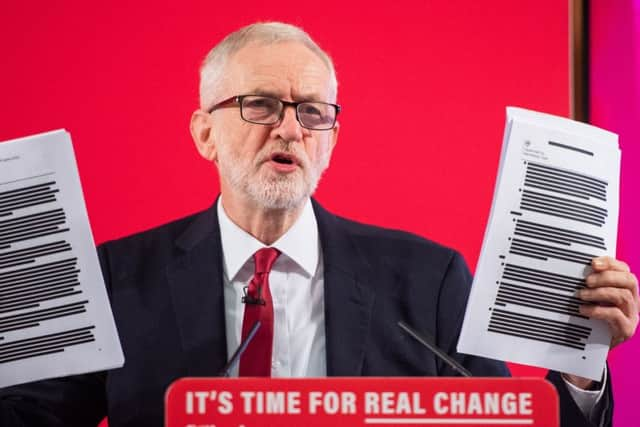Lack of trust in party leaders Boris Johnson, Jeremy Corbyn and Jo Swinson means voters in Yorkshire and beyond face a rotten choice at General Election ballot box - Andrew Vine


Folks tend to tell the truth on their own doorsteps, or when stopped in the street – whether they like a candidate or not and what they think about those competing to be Prime Minister.
And so they have been again this time round. But there’s a difference.
Advertisement
Hide AdAdvertisement
Hide AdAccording to the people pounding the pavements I’ve been talking to, there’s a generalised dislike and distrust of all three main parties and the people who lead them.


It’s a message that Conservative, Labour and Lib Dem activists I know in West and South Yorkshire have been picking up. None would expect to be welcomed with open arms. It is an election after all, and those who campaign in it are wearily familiar with the public getting a lot off their chests about politics.
But what’s bothering these committed campaigners is the widespread feeling of negativity on the part of voters. There’s no excitement about this election, no feeling of enthusiasm and an absence of any sense that on December 12 they will be voting for a better future.
Advertisement
Hide AdAdvertisement
Hide AdNone of the parties’ policies are really cutting through or firing up voters, and there’s a simple reason for that.
The message coming back is that what’s on offer is a rotten choice. The party leaders on whose personalities so much depends are simply failing to inspire because they’re a particularly unappealing bunch.
Voters don’t trust Boris Johnson because he comes over as slippery. They don’t fancy Jeremy Corbyn because he’s too left-wing and would bankrupt the country. And they think Jo Swinson is strident and out of her depth.
The decision they face on polling day is to choose the best of a bad lot. Tony Blair hit the nail on the head this week when he said the main plank of both Labour and Conservative campaigning was to insist that they were the least worst option.
Advertisement
Hide AdAdvertisement
Hide AdWith 13 days left to the election, this has turned into the most negative and defensive campaign in living memory.
A massive credibility gap has opened between politicians and the voters of Yorkshire and beyond, who simply do not believe what they are being told.
Alongside this is a developing sense of resentment at being taken for fools.
Advertisement
Hide AdAdvertisement
Hide AdPolling three days ago found only 18 per cent of those questioned believed Labour’s spending plans were realistic. The Tories fared little better, with only 21 per cent believing the key manifesto pledge to give the NHS an extra 50,000 nurses.
What is increasingly apparent to the activists on the ground in our towns and cities is a widespread disenchantment with politics and the candidates campaigning to be Prime Minister.
There’s a feeling that none of them are quite up to the mark, lacking in substance and the ability to lead.
Strategists and spin doctors hunkered down in London orchestrating policy announcements and photocalls simply haven’t grasped this. They are shut away from the electorate, quarantined from the real world that voters occupy.
Advertisement
Hide AdAdvertisement
Hide AdPart of this disconnect comes from the way campaigns are being run. Avoiding contact with the public except in strictly-controlled encounters has become almost a fetish.
It’s all too scripted and risk-averse. Voters see straight through this, and aren’t fooled for a moment. They know instinctively why close scrutiny is avoided at all cost. It’s because the answers are full of holes.
And part of the disillusionment has to do with the sheer fatigue, and even anger, amongst the public over Brexit. The three-year saga has sapped faith in politicians of all parties, who are perceived as having left the country in limbo, no more certain of its destiny than on the morning after the 2016 referendum.
Whether in favour of leaving or staying in the EU, voters are telling canvassers that they don’t trust leaders insisting they have the answers. There’s a sense that none of them really knows how to break the deadlock.
Advertisement
Hide AdAdvertisement
Hide AdBoris Johnson’s repeated assurances that if only Parliament agrees his Brexit deal, the country will move forward just won’t wash. People know that is only the beginning, and the distinct possibility remains of Britain crashing out of the EU without a deal in a year’s time, with potentially disastrous consequences for their jobs.
Public warned to guard against political parties mimicking trusted local newspapers, The Yorkshire Post saysNor does the woolliness of Jeremy Corbyn’s position convince anybody. A long-time Labour activist told me how aghast he was when the man who wants to be Prime Minister declared on television that he would take a neutral position on Brexit.
“How do I persuade people to back that?” he asked. “The biggest decision the country faces, and he won’t say if he’s in favour of leaving or staying.”
A Lib Dem campaigner was equally despairing of Jo Swinson’s declaration that Article 50 will be revoked without asking the public if it agrees.
Advertisement
Hide AdAdvertisement
Hide AdShe pointed out that if Ms Swinson joined her out canvassing, she’d quickly get very fed up of roughly half the people refusing to even take a leaflet or countenance voting for the party because they backed Brexit.
Because Yorkshire is such a political barometer for the rest of the country, with its marginal seats that could play a key role in the election’s outcome, it’s perfectly plausible to suggest that the disillusionment and distrust that canvassers are encountering in our towns and cities are replicated across Britain.
None of them feel that their parties are making the impact they hoped for, and all share a sense that the campaign strategies are somehow just not quite right. And the outcome? All reluctantly agree that what Yorkshire voters appear to be saying is they don’t trust the leaders enough to give any of them a decisive win.